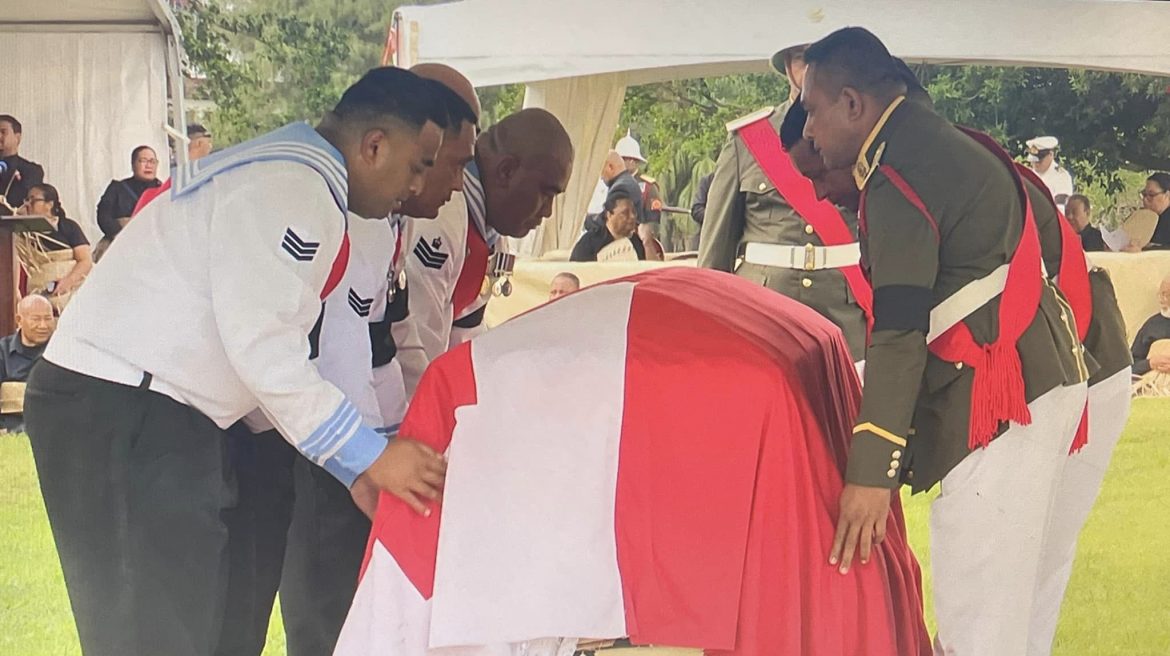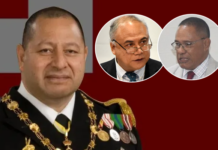This Content Is Only For Subscribers
An unexpected change to the protocol of the king’s kava ceremony which meant the two alofis’ fonos were not called out this morning has sparked intense debate.

The pongipongi tapu (sacred morning) at the Nuku’alofa royal palace was presented to mark the first morning of the week after the late Princess Melesiu’ilikutapu Kalaniuvalu Fotofili’s burial at Tonga’s royal tomb Mala’ekula on June 3. Her Royal Highness passed away in Auckland at age 75.
The formal ceremony normally includes several customs, including the fakanofonofo (seating) of the two alofis or two sides of the kava ring divided by the king and the tou’a or kava makers’ seats, preparation of the kava by the tou’a to be distributed among the king and the nobles as well as the fakatū’uta. Fakatū’uta is the setting out of the ngāue, which are slaugthered hogs, yams and kava in rows inside the ‘alofis.
The ngāue has to be counted aloud by matāpules and be acknowledged aloud by the king’s ‘apa’apa ‘o e hau Māliepō, also known by his estate title Lauaki. He is the matāpule in charge of the ceremony, if it was to mark a royal funeral, and who always sat next on the king’s left
It is normal that following the fakatū’uta Māliepō orders one of the pigs to be cut into pieces. The fakala’ā part (back) of the hog, which is regarded as the most chiefly and the liver, must be taken and placed close to the king as his share. This must be done first before the rest of the cuts are distributed among the rest of the nobles sitting in the ‘alofis.
The next process is the kaifono. Kai means eat while fono refers to the food or the pieces of pork from the cuts. Kaifono also refers to the fahu who claim the fonos. The fahu is normally the highest ranking niece or grand-niece of the nobility in the alofis from their eldest female sibling’s or paternal aunt’s lines.
After the king’s fono is taken the protocol requires Māliepō to call out the names of the rest of those in the alofis one by one and indicated to their fahu to enter the alofi and take it. Since the king does not have a fahu, according to the custom his fono must be claimed by a non-Tongan person. This morning it was Hugh Moore, the son of the Australian High Commissioner to Tonga who became the king’s kaifono.
However, Māliepō changed the kaifono protocol this morning and announced that after he called out the king’s kaifono “ko ‘etau lava’ ia,” meaning the rest of the fonos must be removed from the alofis and taken outside quietly.
Online debate
The incident triggered an online debate, with people asking whether Māliepō was breaching the protocol.
Some wondered whether this was the new way of conducting the king’s kava ceremony.
A Tongan language tutor in Australia, Uanivā Havea, asked her followers on Facebook to help her understand why the nobility’s fonos were not called out.
Responding, a commenter said it was a tekelangi (boosting the dignity) designed by Māliepō to boost the dignity of the king to make the day special. The commenter said Māliepoo’s decision made the ceremony unique in the sense that only the king had his fono called out and no one else.
Some said the young Māliepō was new to the role and he has a lot to learn.
A cousin of Queen Nanasipau’u Tuku’aho commented on another post and said the king did not know about the change.
Hon. Tupou ‘Ahome’e Faupula said it was totally wrong to stop it (“hala aupito foi taofi”). She said Prince Ata talked to Princess Sinaitakala and it was clear there was no plan for a change.
She said all the fahus were ready to take their kaifono.
Hon. Faupula was responding to a post by Cass Vaea who said Māliepō stopped the nobility’s kaifono as a “tekelangi” of the king.
Not unusual
It is not new for the king’s leading matāpules to make unexpected changes in a royal ceremony as a tekelangi.
In a graduation ceremony at ‘Atenisi University in Tongatapu in 1990s, the late King Taufā’ahau was invited as guest of honour.
The university students performed a fakatū’uta or presentation as part of the royal reception but when the university’s matāpule, late Lehā’uli Vaivai was about to address the king he noticed that the king’s two matāpules were sitting very close to His Majesty.
Lehā’uli regarded that as disrespectful to the king and scolded the duo and told them to step down and sit away from the king. It triggered heated exchanges between Lehā’uli and the matāpules. Lehā’uli finally withdrew the fakatū’uta and said he would present it directly to the king at his palace later that day.
Professor Futa Helu of ‘Atenisi later explained that that was when such royal ceremony was tau-e-langi, an expression which literally means reaching the sky, referring to the moments and duration of excitement people experience because something unusual, but interesting, had happened. It made the day more memorable.







